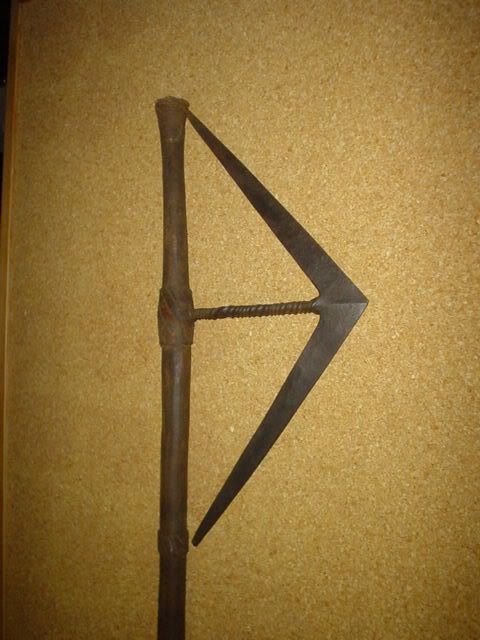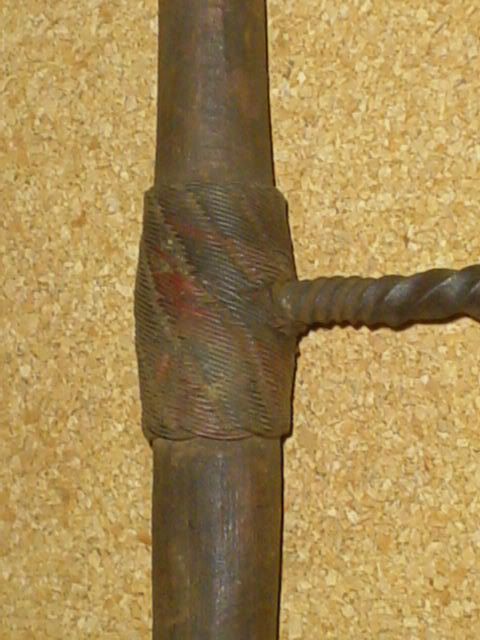
 |
|
|
#1 |
|
(deceased)
Join Date: Dec 2004
Location: Portugal
Posts: 9,694
|
Hello, please help.
I have just bought this spear, without any kind of classification. I assumed it is african, and tryed to associate it to the examples shown in some comercial web pages. I saw a couple Zulu assegais looking somehow familiar, but there is something with the dimensions of my piece, specially the blade, that doesn't fit with such weaponry. This blade is 7/8" wide and is only 3 1/2" long, even shorter than its 3 3/4" tang. The ferrule has 2" and is woven with iron wire. Could this be in fact an war weapon? or should it serve other purpose? Any coments on its identification and age would be so much wellcome. |
|
|

|
|
|
#2 |
|
Vikingsword Staff
Join Date: Dec 2004
Location: The Aussie Bush
Posts: 4,524
|
Fernando:
Spears are tricky, especially when there is not an overall view. How long it is, what materials it is made from (especially the shaft), how the shaft is attached to the business end, the shape of the spear blade, etc. can all be clues to its origin. Do you have any particular reason to think this one is African? The blade looks fairly simple and could come from a number of different parts of the world. Looking at the way the shaft is attached to the point, there appears to be some binding with woven fibers. That might suggest an Asian origin. In looking at the particular weave on your example, it reminds me of Naga work which is quite different from, say, Burmese/Thai rattan work or examples from the Dayak (Borneo) or Ifugao (Philippines). More pictures of your spear would definitely help. Ian. |
|
|

|
|
|
#3 |
|
Member
Join Date: Dec 2004
Location: What is still UK
Posts: 5,925
|
Typical South African spear, could have come from many tribal groups. Tim
|
|
|

|
|
|
#4 |
|
(deceased)
Join Date: Dec 2004
Location: East Coast USA
Posts: 3,191
|
Hi fernando
Your spear is African either Zulu or Shona but I think more Zulu. It is a throwing spear (isiJula (plural: iziJula) – short-bladed throwing spear, used in battle. rather than an assegai or stabbing spear. The braided collar is a dead giveaway. Lew |
|
|

|
|
|
#5 |
|
(deceased)
Join Date: Dec 2004
Location: Portugal
Posts: 9,694
|
Thank you all.
Any chance this piece is from the 19th century? Lew, do you mean the braided collar is only ornamental? I thaught it was there for securing the shaft to the blade. Doesn't assegai mean a throwing spear ? Are there differences in tipology? |
|
|

|
|
|
#6 |
|
Member
Join Date: Dec 2004
Location: Sint-Amandsberg (near Ghent, Belgium)
Posts: 830
|
You're quite right. The braided collar is for securing the blade to the shaft. A South African spear blade has a tang which goes into the shaft. The collar prevents the wood from splitting. Besides being practical, I think it also enhances the beauty of the weapon.
Your spear seems to be a good old specimen. On newer spears (and also on axes) the collar is often made of braided electrical wire. Not that these are no good, but they are younger. Your spear is a throwing spear, as was already mentioned. That's probably why it has such a light blade. I had a look around on the internet and the word 'assegai' was mostly used for a stabbing spear. These had larger heads and were heavier. |
|
|

|
|
|
#7 |
|
Member
Join Date: Dec 2004
Location: What is still UK
Posts: 5,925
|
Hi fernado, these southern African/Zulu type spears the binding can be steel or brass wire, vegetal fibre or a dried leather/gut shrink fit method of helping to hold the blade. The true early stabbing assegai of the Zulu wars had a large blade and quite a stout haft. There are latter 19/20th cent stabbing spears with a smaller blade. There is a good chance your spear is 19th cent. This may sound silly but if it has a thin haft and feels like you could throw it then it probably is a throwing spear
 Here are pictures of one I have. These are said to have be carried as a small bundle and thrown before engaging with a stabbing spear. I find it fascinating that warriors armed with these and other simple weapons gave the British army, one of the most modern in 19th cent, a jolly good hiding more than once Here are pictures of one I have. These are said to have be carried as a small bundle and thrown before engaging with a stabbing spear. I find it fascinating that warriors armed with these and other simple weapons gave the British army, one of the most modern in 19th cent, a jolly good hiding more than once  . Tim . Tim
|
|
|

|
|
|
#8 |
|
Member
Join Date: Dec 2004
Location: Sint-Amandsberg (near Ghent, Belgium)
Posts: 830
|
Here is the braided collar of a Swazi axe.
 
|
|
|

|
|
|
#9 |
|
Member
Join Date: Dec 2004
Location: What is still UK
Posts: 5,925
|
Love!! the axe Freddy, makes me want to show mine again
 Tim Tim
|
|
|

|
|
|
#10 |
|
Member
Join Date: Dec 2004
Location: Sint-Amandsberg (near Ghent, Belgium)
Posts: 830
|
Very nice ! Are the bindings also metal ?
|
|
|

|
|
|
#11 |
|
Member
Join Date: Dec 2004
Location: What is still UK
Posts: 5,925
|
Yes metal binding, quite fine wire with iron pegs embeded in the haft in a decorative manner.
|
|
|

|
|
|
#12 |
|
(deceased)
Join Date: Dec 2004
Location: Portugal
Posts: 9,694
|
Thank you, the precious pictures and teachings explain a lot.
My doubt on the terminology was that, Assegai (Azagaia = Az-zágaiă), is a term originated in a throwing spear. I will consider that its atribution changed in the circumstances. Tim, how long ant thick is the haft of your pictured spear ? is it regularly straight and round finished ? I still have reserves about mine. Is it possible to remount the blade on a new haft, without losing the consistence of the braided collar ? |
|
|

|
|
|
#13 |
|
Member
Join Date: Dec 2004
Location: What is still UK
Posts: 5,925
|
My spear is 142cm, metal part 33cm, spear point 10.5cm, width of haft 1.7cm. Yours looks unaltered to me. Tim
|
|
|

|
|
|
#14 |
|
(deceased)
Join Date: Dec 2004
Location: Portugal
Posts: 9,694
|
Thank you Tim
I regcognize this spear. You have already post it in this forum, a while ago, right ? I was actually influenced by having seen this piture, when i got suspicious about my haft. While yours is naturaly bent and gets thicker towards the butt ( i think a traditional procedure ), mine is practicaly straight ... no bending and no thickness variations.This looked too correct to me, as i had no other references on these african spears I will get used to it. Sorry for my funny english. Thanks a lot. |
|
|

|
|
|
#15 |
|
Member
Join Date: Dec 2004
Location: Sint-Amandsberg (near Ghent, Belgium)
Posts: 830
|
The reason that a spear shaft is bent, can be attribuated to the fact that it has been standing, for example in a corner against a wall, for quite some time. I've seen this often.
I prefer to 'hang' my spears. There are two ways. Vertically by tying a piece of rope just beneath the spearhead and hanging it on a nail. Or horizontally, by using several nails spread over the length of the shaft, depending on the weight of the piece.  
|
|
|

|
|
|
#16 |
|
Member
Join Date: Dec 2004
Location: What is still UK
Posts: 5,925
|
Hi fernando,
The haft on your spear does look a little odd. Looking closely at your first pictures there does seem to be some gum and radial scratches at the union of binding and haft which are a little suspicious. At the end of the 19th cent and under white rule, tribes men would still want to parade with a traditional weapon a bit like being well dressed. So small blades were probably more acceptable to the ruling whites. There are a lot of "Zulu" stabbing spears with these small blades for sale but IMHO they are for dress. I think you may be right, the haft does look a little clumsy. You will survive, you should have a look at the rubbish I have acquired . Tim |
|
|

|
|
|
#17 |
|
Member
Join Date: Dec 2004
Location: What is still UK
Posts: 5,925
|
Freddy, we need a better picture of the fat bladed spear by the back door. Tim
|
|
|

|
|
|
#18 |
|
Member
Join Date: Dec 2004
Location: Sint-Amandsberg (near Ghent, Belgium)
Posts: 830
|
Tim, I've posted a new thread regarding this 'fat bladed' spear.
|
|
|

|
 |
|
|